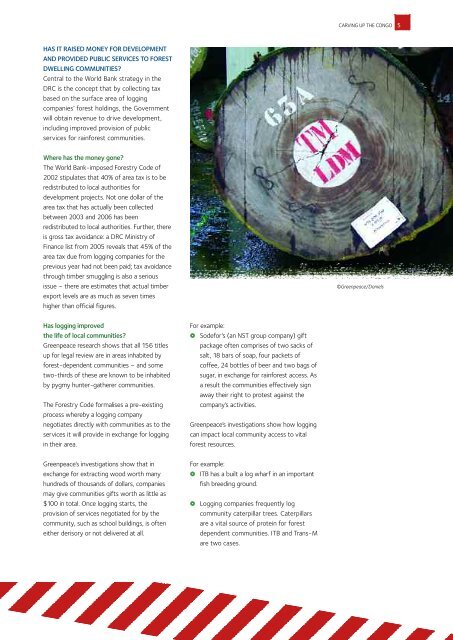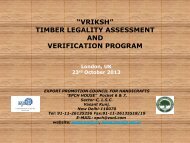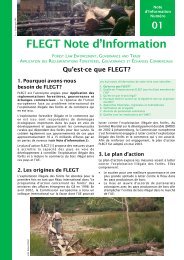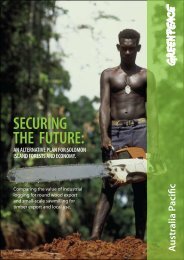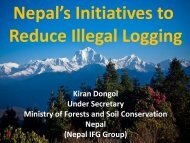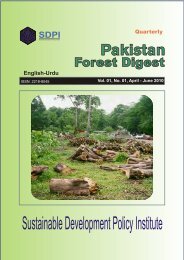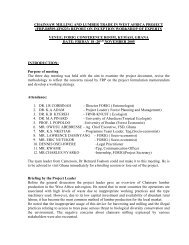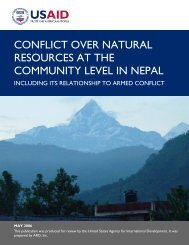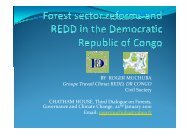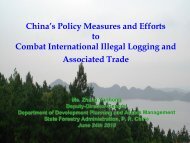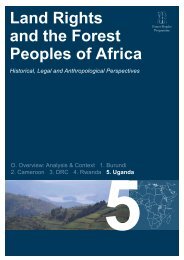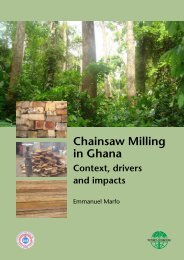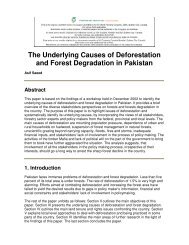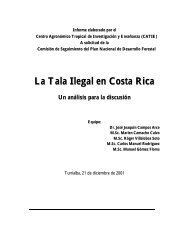Untitled - Illegal Logging Portal
Untitled - Illegal Logging Portal
Untitled - Illegal Logging Portal
You also want an ePaper? Increase the reach of your titles
YUMPU automatically turns print PDFs into web optimized ePapers that Google loves.
CARVING UP THE CONGO 5HAS IT RAISED MONEY FOR DEVELOPMENTAND PROVIDED PUBLIC SERVICES TO FORESTDWELLING COMMUNITIES?Central to the World Bank strategy in theDRC is the concept that by collecting taxbased on the surface area of loggingcompanies’ forest holdings, the Governmentwill obtain revenue to drive development,including improved provision of publicservices for rainforest communities.Where has the money gone?The World Bank-imposed Forestry Code of2002 stipulates that 40% of area tax is to beredistributed to local authorities fordevelopment projects. Not one dollar of thearea tax that has actually been collectedbetween 2003 and 2006 has beenredistributed to local authorities. Further, thereis gross tax avoidance: a DRC Ministry ofFinance list from 2005 reveals that 45% of thearea tax due from logging companies for theprevious year had not been paid; tax avoidancethrough timber smuggling is also a seriousissue – there are estimates that actual timberexport levels are as much as seven timeshigher than official figures.©Greenpeace/DanielsHas logging improvedthe life of local communities?Greenpeace research shows that all 156 titlesup for legal review are in areas inhabited byforest-dependent communities – and sometwo-thirds of these are known to be inhabitedby pygmy hunter-gatherer communities.The Forestry Code formalises a pre-existingprocess whereby a logging companynegotiates directly with communities as to theservices it will provide in exchange for loggingin their area.Greenpeace’s investigations show that inexchange for extracting wood worth manyhundreds of thousands of dollars, companiesmay give communities gifts worth as little as$100 in total. Once logging starts, theprovision of services negotiated for by thecommunity, such as school buildings, is ofteneither derisory or not delivered at all.For example:s Sodefor’s (an NST group company) giftpackage often comprises of two sacks ofsalt, 18 bars of soap, four packets ofcoffee, 24 bottles of beer and two bags ofsugar, in exchange for rainforest access. Asa result the communities effectively signaway their right to protest against thecompany’s activities.Greenpeace’s investigations show how loggingcan impact local community access to vitalforest resources.For example:s ITB has a built a log wharf in an importantfish breeding ground.s <strong>Logging</strong> companies frequently logcommunity caterpillar trees. Caterpillarsare a vital source of protein for forestdependent communities. ITB and Trans-Mare two cases.


